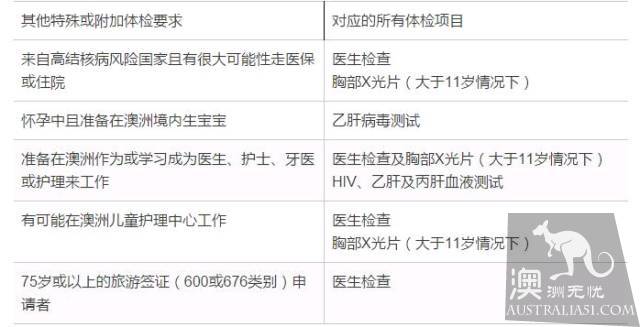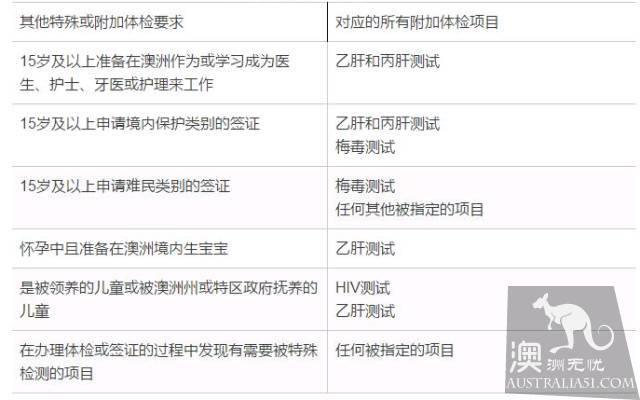In addition to short-term travel visas, no matter what kind of Australian visa you apply for, the Australian Immigration Service will require the applicant to submit a medical certificate, and these medical certificates must be approved by the Australian people's Office. A designated hospital or medical institution (medical examination institution) to issue the certificate. This is because of the important regulations made by the Australian goverment to protect the health and safety of all people in Australia and to give priority to their citizens and the health needs of the PR.
In addition, Australian health benefits are rare in the world, but these benefits rely on Australian people to pay tax results. According to Australia's goverment, new immigrants are heavy on Australia's health-care system if they have a large number of illnesses they need to be treated for. As a result, every applicant who emigrates to Australia needs a rigorous medical check-up, which excludes the possibility of increasing the medical burden.
So, let's see which Australian visa / immigration categories require a medical check-up and what diseases are likely to be rejected by the Australian Immigration Service.
Physical examination required for different visa types
Temporary entry visas include the longest-seen student visa (573500), graduation visa (573500), or tourist visa (600). The requirements for a medical examination of this type of visa are relatively variable, depending mainly on the type of visa applied for. How long do you want to stay in Australia, what are you doing in Australia, your country's TB (TB) rating, what special circumstances are there, what are the major existing conditions to judge?
To know if you need a medical check-up, look at this form.

According to the Australian Immigration Service, mainland China, Hong Kong, Macao, Taiwan, Singapore and Malaysia are all countries and regions where a medical examination is required. Therefore, if you want to stay in Australia for more than six months, please do so.
In addition, in three special cases, they will also be required to undergo a medical examination.
a. When there's a special medical requirement,
This requirement means that, even if immigrants are no longer routinely required to be examined, the Immigration Service has additional requirements for immigrants to undergo a medical examination, as detailed in the table below.

b. If you were in Australia in the first 28 days,
Immigration requires an applicant to undergo a medical examination when applying for a travel visa within the country.
C. If a special test is found in the course of a medical examination or visa
2, temporary residence (Provisional Visa) or permanent residence (Permanent Visa) visa
A medical examination is required when applying for a temporary residence visa and a permanent residence visa. Temporary residence belongs to the visa obtained by the applicant when the requirement for a permanent residence visa has not been met, and permanent residence is what we often refer to as PR. The medical examination requirements for these two visas are as follows.

In addition, if there is a special case, the applicant also needs to enter additional medical examination, the additional medical examination items are as follows.

Diseases affecting visas or immigrants
Australia applies to all visa applicants as well as appended applicants (and in extreme cases it may also be able to move or not to emigrate, The health requirements for visa applicants as long as they are dependent on other family members are as follows: they must not carry a virus or disease that poses a significant threat to Australia. It must not be possible to incur huge costs or costs to Australia's health care or public service sector in the future, or to compete with Australian citizens or green cards for limited health-care resources, (Prejudice To Access).
Must not carry viruses or diseases that pose a major threat to Australia
There are five major common threats to viruses or diseases: tuberculosis (Tuberculosis,TB), HIV or hepatitis (Hepatitis), yellow fever (Yellow Fever), poliomyelitis (Polio) and Ebola (Ebola).)
Tuberculosis (Tuberculosis,TB)
In the case of more than 11 years of age, the temporary entry of a citizen from a country or region requiring a medical check-up is longer than 6 months, permanent residence or a special request for a tuberculosis check-up. In principle, they will not be specifically required under the age of 11, but 2-10-year-olds will also be required to test for tuberculosis when they apply for humanitarian assistance abroad or for asylum protection visas within their territories. Applicants who are in high-risk areas of tuberculosis and are applying for temporary residence or permanent residence visas who are in close contact with family members with tuberculosis although they apply for temporary entry visas.
If the applicant is found to have tuberculosis now, it will unfortunately be rejected, and if the application has been found to have had TB but is not now ill, the applicant may be asked to sign a health agreement, (Health Undertaking), And there's a good chance that you'll get a visa.
HIV
Applicants who are ready to become doctors, nurses, dentists, or nurses after studying in Australia are required to have an HIV check-up. Applicants over and above the age of 15 who are applying for a permanent residence visa and those under the age of 15 who are applying for an adoption visa are required to do so, in addition to having had a blood exchange record; There are any medical records indicating that you may be HIV-positive, or applicants whose birth mother is HIV-positive also need the test.
Hepatitis (Hepatitis)
Similar to HIV tests, applicants preparing to work or study as doctors, nurses, dentists or nursing in Australia require hepatitis tests. In addition, pregnant women, applicants who are applying for adoption visas, Applicants who are applying for humanitarian or protection visas, unaccompanied child refugees need hepatitis tests.
If the test results are available to prove that the applicant has reached a certain level of viral level or has a risk of blood contact with others, and the applicant is applying for a temporary entry visa, he or she will be refused a visa. In other cases it is possible to sign if you are not defined as likely to incur huge costs or to rob limited medical resources of (PTA).
Yellow fever (Yellow Fever)
If the applicant has stayed for longer than one night in the country where yellow fever has occurred in the first six days of his visit to Australia, and you are older than or equal to one year old, the Migration Board recommends that you issue an international vaccine injection card, (International Vaccination Certificate)
Polio (Polio)
There are only ten countries left in the world: Afghanistan, Cameroon, Equatorial Guinea, Ethiopia, Iraq, Israel, Nigeria, Pakistan, Somalia and Syria. So children who have spent more than 28 days in Australia from the nine countries other than Israel, or after May 5, 2014, need a polio injection certificate.
Ebola, (Ebola).
Since December 2015, the World Health Organization (WHO) has announced that Ebola has been effectively eliminated worldwide, so Australia's Ebola requirements for immigrants have been minimized.
Other cases of refusal to sign.
Potential applicants for future huge costs or costs to Australia's health care or public service secto
The current measure of huge costs is AU$40000. Temporary entry visas are measured for a total length of less than 40,000 Australian dollars, and permanent entry visas for five years (75 years and over for 3 years). By far, the five most common cases are AIDS (HIV positive), cancer, intellectual disability, functional disability, and kidney disease or failure. However, if the applicant has a permanent or ongoing case, it is also possible for the applicant to obtain a temporary entry visa as long as the applicant's remaining medical events can be predicted.
It is possible to compete with Australian citizens or PR for limited medical resources (PTA,Prejudice To Access) applicants)
PTA currently includes only dialysis (Dialysis) and organ transplant (OrganTransplants). If the applicant is unfortunately infected with these two diseases, it is very sorry that he or she will be denied a visa.
Generally speaking, the most common hepatitis, tuberculosis is not entirely refused, as long as the immigration authorities to provide relevant materials, applicants can successfully enter or emigrate to Australia.
Finally, I hope that every reader can have a strong body, successful entry or immigration to Australia!